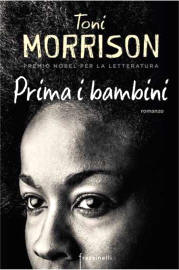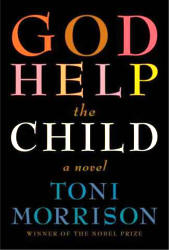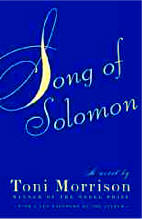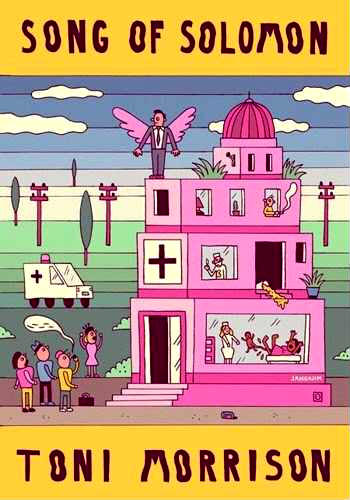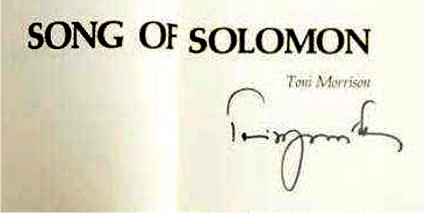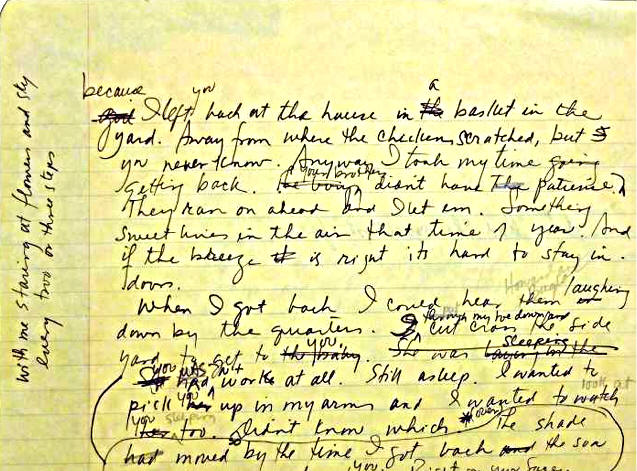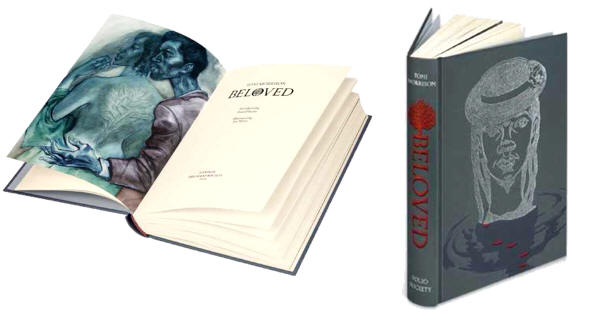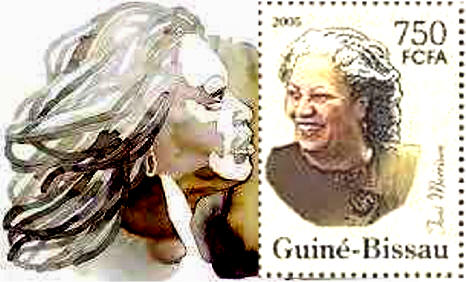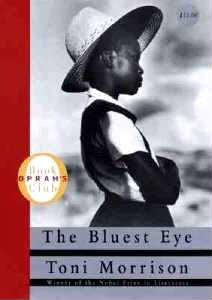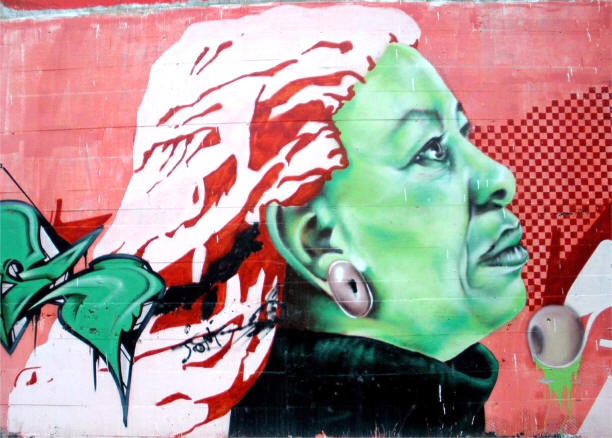|
toni morrison chloe ardelia anthony wofford
You can do some rather
extraordinary things if that's what you really believe
None of us is alone
Ho fatto un viaggio e ho pagato il biglietto Ma lascia che ti dica una cosa : mi è costato troppo I got a tree on my back and a haint in my house and nothing in between but the daughter I am holding in my arms. No more running - from nothing. I will never run from another thing on this earth. I took one journey and I paid for the ticket, but let me tell you something, Paul D Garner:
it cost too much! Do you hear me? It cost
too much.
non ricordo la mia vita prima dei libri .
RECITATIF - 2022 Morrison also completed plays, poems, essays and short stories, one of which is coming out as a book .
' Recitatif ' written by Morrison in the
early 1980 and rarely seen over the following decades, follows the
lives of two women from childhood to their contrasting fortunes as
adults . .
Recitatif keeps Twyla's and Roberta's
races ambiguous throughout the story . We know
that one is white and one is black, but which is which ?
And who is right about the race of the woman the girls tormented at
the orphanage ? . .
TUTTI I ROMANZI di Toni Morrison hanno la caratteristica comune delle prospettive multiple e della frammentazione voluta del racconto
In tal modo
ogni ROMANZo diventa un
insieme di storie concepite come parti integranti della
tradizione culturale nera, nel tentativo di creare un genere
vero e proprio, la
letteratura
nera.
Primo elemento distintivo di questa novità è il "target", i
fruitori dei suoi ROMANZI ;
la scrittrice
non scrive per tutti, e tanto meno per i bianchi, qui sta la
grande novità, la sua ribellione ideologica e culturale: ed
infatti ad una prima lettura del testo noi bianchi abbiamo avuto
diverse difficoltà: la prima sensazione è quella di non
comprendere a fondo, di restare troppo in superficie, come se
non si riuscisse a penetrare il significato vero delle parole e
delle frasi.
Contemporaneamente, a tratti, si prova una
sensazione di disagio, quasi di fastidio per il racconto delle
sofferenze e del dolore. E' evidente, Toni Morrison scrive per i
neri, a loro si rivolge in un linguaggio che solo la comunità
nera può capire.
Il bianco che
desidera avvicinarsi al SUO ROMANZo
deve compiere uno sforzo notevole per raggiungere l'essenza vera
dello scritto, il suo messaggio profondo: deve riuscire ad
immedesimarsi e, in particolare nel "The Bluest Eye", deve
calarsi nell' "io" narrante di
una bambina nera che racconta la storia di un'altra bambina
nera che non accetta di essere nera.
Già in questo
contesto l'immedesimazione è molto difficile; inoltre le
situazioni che la scrittrice propone sono spesso piene di
violenza, crudeltà e follia, storie di incesti e di stupri. A
leggere, noi bianchi, facciamo una fatica enorme, come è
possibile immergersi in un universo di pulsioni, paure,
decadenze, emarginazione senza riconoscerlo come un'aberrazione
creata in qualche modo proprio da noi? amy bonagura - pagine70.com
the writer who
has it all: fortune, fame, and talent. She has been
dubbed the Great American Storyteller by Time Magazine,
and The New York Times has named one of her books the
best American novel of the last quarter of the century.
Even this intellectually ossified Europe acknowledged
her brilliant talent when awarding her the Nobel Prize
for Literature. LIBRI libreriauniversitaria.it - unilibro.it - ibs.it - lafeltrinelli.it www.youtube.com Toni Morrison Digital Book Signing the beginnings of the bluest eyes - www.youtube.com/watch
A bestseller is a book that non-book buyers buy
You love her like I love Sula. I just don’t like her . That’s the difference ... The presence of evil was something to be first recognized then dealt with, survived, outwitted, triumphed over ... It was in that summer, the summer of their twelfth year the summer of the beautiful black boys, that they became skittish frightened and bold - all at the same time ... Like any artist with no art form, she became dangerous sula
To be given dominion over another is a hard thing to wrest dominion over another is a wrong thing to give dominion of yourself to another is a wicked thing ... She learned the intricacy of loneliness the horror of color, the roar of soundlessness and the menace of familiar objects lying still a mercy - 2008
THE SOURCE OF SELF-REGARD - longlisted for the Andrew Carnegie Medal for Excellence in Fiction and Nonfiction - fb/tm - 2019
Arguably the most celebrated and revered
writer of our time now gives us a new nonfiction collection--a rich
gathering of her essays, speeches, and meditations on society,
culture, and art, spanning four decades.
The Source of Self-Regard is brimming with all
the elegance of mind and style, the literary prowess and moral
compass that are Toni Morrison’s inimitable hallmark. It is divided
into three parts: the first is introduced by a powerful prayer for
the dead of 9/11; the second by a searching meditation on Martin
Luther King Jr., and the last by a heart-wrenching eulogy for James
Baldwin. In the writings and speeches included here, Morrison takes
on contested social issues: the foreigner, female empowerment, the
press, money, “black matter(s),” and human rights. She looks at
enduring matters of culture: the role of the artist in society, the
literary imagination, the Afro-American presence in American
literature, and in her Nobel lecture, the power of language itself.
And here too is piercing commentary on her own work (including The
Bluest Eye, Sula, Tar Baby, Jazz, Beloved, and Paradise) and that of
others, among them, painter and collagist Romare Bearden, author
Toni Cade Bambara, and theater director Peter Sellars. In all, The
Source of Self-Regard is a luminous and essential addition to Toni
Morrison’s oeuvre.
A writer’s life and work are not a gift
to mankind; they are a necessity .
Toni Morrison writes in the prologue of her latest book, The Source of Self-Regard : Selected Essays, Speeches, and Meditations ... In Morrison’s hands, self-regard becomes the requirement for a life well lived; to remain curious about oneself and one’s place in the world. And at 88, she reminds us that the work of reflection is neverending. maiysha kai - theroot.com - 2019 Clearly we do not deserve Morrison, and clearly we need her badly... In this collection of nonfiction written over the past four decades, the revered (and sometimes controversial) author reinforces her status as a piercing and visionary analyst of history, society, literature, language, and, always, race ... the book explodes into pure brilliance... 'The Source of Self-Regard' is the definitive statement that Morrison, who has thought as much as anyone about the ways countries, cultures, and people fail and hurt each other and themselves, still believes that we can be better. the boston globe - fb/tm - 2019 Memory - the deliberate act of remembering - is a form of willed creation . It is not an effort to find out the way it really was ... ... Language can never ‘pin down’ slavery, genocide, war . Nor should it yearn for the arrogance to be able to do so . Its force, its felicity is in its reach toward the ineffable . fb/tm - 2019 Don’t let anybody, anybody convince you this is the way the world is and therefore must be . It must be the way it ought to be . fb/tm - 12.6.2020 penguinrandomhouse.com/the-source-of-self-regard-by-toni-morrison
THE ORIGIN OF OTHERS - L'ORIGINE DEGLI ALTRI
America’s foremost novelist reflects on the themes that preoccupy
her work and increasingly dominate national and world politics:
race, fear, borders, the mass movement of peoples, the desire for
belonging. What is race and why does it matter? What motivates the
human tendency to construct Others? Why does the presence of Others
make us so afraid?
Toni Morrison racconta di come, nel
Ventesimo secolo, i neri non più schiavi iniziano a decidere tra
loro quale gradazione di nero sia più nera di altre.
Che cosa è la razza, e perché le diamo tanta importanza? Che cosa
spinge gli esseri umani a costruire «un altro» da cui
differenziarsi? Perché il colore della pelle ha avuto nella storia
un peso così negativo? Perché la presenza dell'altro da noi ci fa
così paura? Toni Morrison, in un testo che si impone come una vera e
propria orazione civile, va in cerca delle risposte a queste domande
parlando di sé, della sua opera, di letteratura, storia e politica,
partendo dal XIX secolo e arrivando fino ai giorni nostri, e alle
grandi migrazioni che caratterizzano il mondo globalizzato.
"L'origine degli altri" è un libro di straordinaria attualità, nel
quale i temi che siamo abituati a vedere banalizzati e avviliti nel
dibattito pubblico vengono affrontati dalla scrittrice americana.
Prefazione di Ta-Nehisi Coates e introduzione all'edizione italiana
di Roberto Saviano.
GOD HELP THE CHILD
- prima i bambini
. .
- I'm scared. Something bad is happening to me. I feel
like I'm melting away. I can't explain it to you but I do know when
it started. It began after he said, "you not the woman I want. ... You don't have to love me but you damn well have to respect me . ... But stars can explode, disappear. Besides, what we see when we look at them may no longer be there. Some could have died thousands of years ago and we’re just now getting their light. Old information looking like news. ... Taught me a lesson I should have known all along. What you do to children matters. And they might never forget. fb/tm - 2016 ...
il modo in cui il trauma dell’infanzia forma e deforma la vita
dell’adulto In Morrison's short, emotionally-wrenching novel, her first since 2012's Home, a mother learns about the damage adults do to children and the choices children make as they grow to suppress, express, or overcome their shame. The story begins with the birth of Lula Ann Bridewell, a midnight black baby whose mother cannot stand to touch her. Grown-up Lula Ann transforms herself into Bride, a stiletto-wearing, Jaguar-driving California executive with dark skin proudly accentuated by stylish white clothing. Amid preparations for the launch of her signature cosmetics line, Bride offers a gift-bag of cash and cosmetics to parolee Sofia Huxley, the kindergarten teacher Bride accused of sexual abuse 15 years before, earning Bride maternal approval and Sofia her prison sentence. Sofia's angry rejection of Bride's present, coinciding with the departure of Bride's lover, inspires such self-doubt that Bride fears regressing back into Lula Ann. A car accident lands her in a culvert, where a little girl keeping dark secrets of her own comes to the rescue. Nobel laureate Morrison explores characteristic themes of people held captive by inner struggles; the delusion of racism; violence and redemption. Her literary craftsmanship endures with sparse language, precise imagery, and even humor. This haunting novel displays a profound understanding of American culture and an unwavering sense of justice and forgiveness. apr - publishersweekly.com - fb/tm .
Toni Morrison's
new novel challenges the assumption that
writers lose their mojo once they reach a
great age. Morrison, now in her ninth
decade, did not start publishing novels until she was nearly 40 but
proves with 'God Help the Child' that
her writing is
still as fresh, adventurous and vigorous as ever. . Succinct but beautiful, with a powerful message that will reach readers of all demographics, because frankly, we all have things in our pasts we'd like to change. The power is not in time travel - the power is in realizing we must move on and push forward to succeed. sheknows . fb/tm - 2015 .
It’s awful. The present is not good,” Morrison says,
dropping her voice. “Politically it’s horrible. I was writing down
all the countries where there were wars and I just gave up. All the
hawks are screaming. . Toni Morrison wants everyone to know that she hates the title of her newest novel God Help the Child . The original title, Morrison said at Congregation Beth Elohim in New York
was
The Wrath of Children
and
in her opinion it was wonderful.
I’m writing for black people … I don’t have to apologise the guardian - 2016
.
desdemona . I exist in between, now: between being killed and being un-dead; between life on Earth and life beyond it; between all time, which has no beginning and no end, and all space which is both a seedling as well as the sun it yearns for.
The story of Desdemona from Shakespeare's Othello is
re-imagined by Nobel Prize laureate Toni Morrison, Malian singer and
songwriter Rokia Traoré, and acclaimed stage director Peter Sellars.
Morrison's response to Sellars’ 2009 production of Othello is an
intimate dialogue of words and music between Desdemona and her
African nurse Barbary. Morrison gives voice and depth to the female
characters, letting them speak and sing in the fullness of their
hearts. Desdemona is an extraordinary narrative of words, music and
song about Shakespeare’s doomed heroine, who speaks from the grave
about the traumas of race, class, gender, war — and the
transformative power of love. Toni Morrison transports one of the
most iconic, central, and disturbing treatments of race in Western
culture into the new realities and potential outcomes facing a
rising generation of the 21st century. Desdemona concerto teatrale
itinerante attraverso i
continenti e le culture con grande successo. . I DIDN'T WANT TO COME BACK - .PDF - intervista 2015
...
Whose house is this? www.youtube.com/watch?feature=player_embedded&v=b9QDBOc3lFU - Toni Morrison Digital Book Signing ...
THE SONG OF SOLOMON - National Book Critics Circle Award for Fiction in 1978 he was wrong . little by little he remembered fewer and fewer of the details, until finally he had to imagine them, even fabricate them, guess what they must have been. This is a
novel in which mystery unfolds on mystery, revelation on revelation
— in which our vision of what we have seen turns, changes, and takes
shape again, transformed. It is a novel expressing with passion,
tenderness, and a magnificence of language the mysterious primal
essence of family bond a
For now she knew what Shalimar knew: If you surrendered to the air you could ride it. maryland
- A Frederick County school
board member is objecting
to making a Toni Morrison novel available in
high schools. School board member April Miller tells The Frederick
News-Post that she doesn't want her 14-year-old daughter reading "Song
of Solomon"
. The book contains some sexual and violent content.
Miller says that while she doesn't want to ban
books, she thinks the school board should be more involved in
evaluating novels and textbooks that are used in schools. The county
education board was supposed to approve the use of the novel on
Wednesday, but Miller requested that the item be pulled from the
agenda. Highland
Park ISD suspends seven books after parents protest their content
.
You t ... Milkman closed his eyes and opened them. The street was even more crowded with people, all going in the direction he was coming from. All walking hurriedly and bumping against him. After a while he realized that nobody was walking on the other side of the street. ... What difference do it make if the thing you scared of is real or not? ... At 3:00 p.m. on Wednesday the 18th of February, 1931, I will take off from Mercy and fly away on my own wings. Please forgive me. I loved you all. (signed) Robert Smith ... He didn’t mean it. It happened before he was through. She’d stepped away from him to pick flowers, returned, and at the sound of her footsteps behind him, he’d turned around before he was through. It was becoming a habit - this concentration on things behind him. Almost as though there were no future to be had. ...
O Solomon
don’t leave me here ...
The singing woman
... had wrapped herself up in an old quilt instead of a winter coat.
Her head cocked to one side, her eyes fixed on Mr. Robert Smith, she
sang in a powerful contralto. . redesigned book covers - Designer Dimitri Sakelaropolus - The Toni Morrison Society - 2013 . THE SONG OF SOLOMON E UNO DEI LIBRI PREFERITI DAL PRESIDENTE OBAMA fb/morrison - 2013
If you surrendered to the air you could ride it tm - howard university 1953 ... You can't lose what you don't own ... Gimme hate Lord - he whimpered I'll take hate any day But don't give me love I can't take no more love Lord I can't carry it ... fb/tm ... It gives me a sense of perspective. I think Toni Morrison’s writings - particularly Song of Solomon - is a book I think of when I imagine people going through hardship.
That it’s not just pain, but there’s joy
and glory and mystery.
BELOVED - Amatissima - 1987 - For when you need to think critically about American history ... Love is or it ain't - Thin love ain't love at all - You are your best thing - sei tu la tua cosa migliore . sethe . sei tu . Il tuo amore è troppo grande, disse ... ? Troppo grande ? disse lei ... L'amore o c'è o non c'è . L'amore piccolo non è amore per niente . . Sifting daylight dissolves the memory, turns it into dust motes floating in light. . I am Beloved and she is mine. I see her take flowers away from leaves she puts them in a round basket the leaves are not for her she fills the basket she opens the grass I would help her but the clouds are in the way how can I say things that are pictures I am not separate from her there is no place where I stop her face is my own and I want to be there in the place where her face is and to be looking at it too a hot thing. .
Il 124 era carico di rancore. Carico del veleno
d’una bambina. Le donne lo sapevano, e così anche i
bambini. Per anni ognuno aveva cercato a modo suo di sopportare il
rancore di quella casa ma, nel 1873, le uniche vittime rimaste erano
Sethe e sua figlia Denver. La nonna, Baby Suggs, era morta e i
due ragazzi, Howard e Buglar, erano scappati via a tredici anni, non
appena, al solo guardarsi allo specchio, questo si era frantumato
(il segnale per Buglar), non appena erano apparse sulla torta le due
minuscole impronte di una manina (il segnale per Howard). Nessuno
dei due aveva aspettato di vedere altro : l'ennesima
pignatta ricolma di ceci fumanti rovesciati sul pavimento, in un
mucchietto, le gallette sbriciolate sparpagliate a terra,
lungo una linea parallela all'uscio di casa.
Né, tantomeno, avevano atteso uno dei soliti periodi di calma:
le settimane, i mesi persino, in cui niente veniva a turbare la
quiete. Erano svaniti entrambi all’improvviso, nel momento stesso in
cui la casa si era resa colpevole di ciò di cui ognuno di loro
riteneva l’unico insulto da non potersi sopportare o vedere una
seconda volta .
incipit In this here place, we flesh; flesh that weeps, laughs; flesh that dances on bare feet in grass. Love it. Love it hard. Yonder they do not love your flesh. They despise it. They don't love your eyes; they'd just as soon pick em out. No more do they love the skin on your back. Yonder they flay it. And O my people they do not love your hands. Those they only use, tie, bind, chop off and leave empty. Love your hands! Love them. Raise them up and kiss them. Touch others with them, pat them together, stroke them on your face 'cause they don't love that either. You got to love it, you! And no, they ain't in love with your mouth. Yonder, out there, they will see it broken and break it again. What you say out of it they will not heed. What you scream from it they do not hear. What you put into it to nourish your body they will snatch away and give you leavins instead. No, they don't love your mouth. You got to love it. This is flesh I'm talking about here. Flesh that needs to be loved. Feet that need to rest and to dance; backs that need support; shoulders that need arms, strong arms I'm telling you. And O my people, out yonder, hear me, they do not love your neck unnoosed and straight. So love your neck; put a hand on it, grace it, stroke it and hold it up. and all your inside parts that they'd just as soon slop for hogs, you got to love them. The dark, dark liver--love it, love it and the beat and beating heart, love that too. More than eyes or feet. More than lungs that have yet to draw free air. More than your life-holding womb and your life-giving private parts, hear me now, love your heart. For this is the prize. Qui - diceva - in questo posto qui, noi siamo carne: carne che piange e che ride, carne che balla a piedi nudi sull’erba. Amatela. Amatela tanto. Laggiù non amano la vostra carne. La disprezzano. Non amano i vostri occhi – ve li possono anche strappare come niente. Né amano di più la pelle della vostra schiena. Oh, gente mia, laggiù ve la frustano. E non amano le vostre mani, oh, gente mia. Quelle le usano soltanto, le legano, le stringono, le tagliano via o le lasciano vuote. Amate le vostre mani! Amatele! Alzatele e baciatele. Usatele per toccare gli altri, battetele, usatele per carezzarvi la faccia, perché non amano nemmeno quella. Siete voi che dovete amarla, voi! E no, non sono innamorati della vostra bocca. Laggiù ve la spaccheranno di sicuro e ve la spaccheranno di nuovo. Non daranno retta a quello che dirà. Non ascolteranno quello che griderà. Quello che ci metterete dentro per nutrire il vostro corpo, ve lo ruberanno e al suo posto vi daranno gli avanzi. No, non amano la vostra bocca. Dovete amarla voi. E’ della carne che vi parlo, qui. Carne che ha bisogno di essere amata. Piedi che hanno bisogno di riposare e di ballare, schiene che hanno bisogno di sostegni, spalle che hanno bisogno di braccia, di braccia forti, ve lo dico io. E statemi a sentire, oh, gente mia, statemi a sentire. Laggiù non amano il vostro collo, bello dritto e senza cappio. Perciò amate il vostro collo, metteteci una mano sopra, trattatelo bene, carezzatelo e tenetelo dritto. E tutte le parti dentro, che loro butterebbero subito ai porci, dovete amare anche quelle. Il fegato scuro, scuro amatelo, amatelo, e anche il cuore che batte, batte sempre, amate anche quello. Più degli occhi o dei piedi. Più dei polmoni che devono già respirare l’aria libera. Più del vostro ventre che tiene la vita e delle vostre parti personali che danno la vita, ascoltatemi, amate il vostro cuore. Perché questo è il vostro premio. .
I'll tend to her as no mother ever tended a
child, a daughter. Nobody will ever get my milk no more except my
own children. I never had to give it to nobody else--and the one
time I did it was t . No matter what all your teeth and wet fingers anticipated, there was no accounting for the way that simple joy could shake you . . There is a loneliness that can be rocked. Arms crossed, knees drawn up, holding, holding on, this motion, unlike a ship's, smooths and contains the rocker. It's an inside kind--wrapped tight like skin. Then there is the loneliness that roams. No rocking can hold it down. It is alive. On its own. A dry and spreading thing that makes the sound of one's own feet going seem to come from a far-off place. . What for? What does a sixty-odd-year-old slavewoman who walks like a three-legged dog need freedom for? And when she stepped foot on free ground she could not believe that Halle knew what she didn’t; that Halle, who had never drawn one free breath, knew that there was nothing like it in this world. It scared her.
. . And in all those escapes he could not help being astonished by the beauty of this land that was not his. He hid in its breast, fingered its earth for food, clung to its banks to lap water and tried not to love it. On nights when the sky was personal, weak with the weight of its own stars, he made himself not love it. Its graveyards and its low-lying rivers. Or just a house – solitary under a chinaberry tree; maybe a mule tethered and the light hitting its hide just so. Anything could stir him and he tried hard not to love it.
. Saying more might push them both to a place they couldn’t get back from. He would keep the rest where it belonged: in that tobacco tin buried in his chest where a red heart used to be. Its lid rusted shut. . If you go there - you who was never there - if you go there and stand in the place where it was, it will happen again; it will be there, waiting for you ... even though it’s all over - over and done with - it’s going to always be there waiting for you. . Let me tell you something. A man ain’t a goddamn ax. Chopping, hacking, busting every goddamn minute of the day. Things get to him. Things he can’t chop down because they’re inside. . And if she thought anything, it was No. No. Nono. Nonono. Simple. She just flew. Collected every bit of life she had made, all the parts of her that were precious and fine and beautiful, and carried, pushed, dragged them through the veil, out, away, over there where no one could hurt them. Over there. Outside this place, where they would be safe. . Everybody knew what she was called, but nobody anywhere knew her name. Disremembered and unaccounted for, she cannot be lost because no one is looking for her, and even if they were, how can they call her if they don't know her name? Although she has claim, she is not claimed. .
There're no clouds here. . Risky, thought Paul D, very risky. For a used-to-be-slave woman to love anything that much was dangerous, especially if it was her children she had settled on to love. The best thing, he knew, was to love just a little bit, so when they broke its back, or shoved it in a croaker sack, well, maybe you'd have a little love left over for the next one. ... Freedom is choosing your responsibility. It's not having no responsibilities; it's choosing the ones you want. ... He knew exactly what she meant: to get to a place where you could love anything you chose - not to need permission for desire - well now, that was freedom . Sapeva esattamente quel che Sethe voleva dire : Arrivare in un posto dove uno poteva amare tutto quello che voleva – senza dover chiedere il permesso di desiderarla – be’, ecco, quella sì che era libertà .
TM’s definition of freedom - fb/nobelprize IL ROMANZo piu' importante di Toni Morrison, edito nel 1987 e che le apri' la strada al Nobel del 1993. Si intitola 'Amore' quello pubblicato dopo e in cui il titolo, ancora una volta, sottolinea una mancanza, un desiderio quello appunto di sentimenti veri, positivi, in un mondo in in cui sembrano mancare del tutto. Il primo analizzava i rapporti tra padroni e schiavi, questo quelli tra uomini e donne nere, spesso non meno violenti e mercificati, prima della presa di coscienza e la rivoluzione degli anni '60. Quel che racconta oggi questa scrittrice di colore, sempre intensa e lucida, e' una societa' che la segregazione razziale aveva reso piu' solidale e eguale, mettendo assieme e sullo stesso piano uomini di levatura e classi diverse, ma anche piu' chiuso e legato a costumi omogenei e difficili da modificare, in cui le donne erano oggetti, viste e usate come mezzo di scambio e di piacere da padri e mariti padroni. Una societa' colta in un momento di passaggio, tra gli anni quaranta e le prime timide manifestazioni per i diritti civili anni sessanta, tra linciaggi e presa di coscienza civile e personale del 'black is beautiful'. ansa White people believed that whatever the manners, under every dark skin was a jungle. Swift unnavigable waters, swinging screaming baboons, sleeping snakes, red gums ready for their sweet white blood. In a way ... they were right ... But it wasn’t the jungle blacks brought with them to this place ... It was the jungle whitefolks planted in them. And it grew. It spread ... until it invaded the whites who had made it ... Made them bloody, silly, worse than even they wanted to be, so scared were they of the jungle they had made. The screaming baboon lived under their own white skin; the red gums were their own. I bianchi credevano che qualunque fosse la loro educazione, sotto ogni pelle scura si nascondesse una giungla. Acque vorticose non navigabili, babbuini che si dondolavano gridando, serpenti addormentati, gengive rosse pronte a succhiare il loro sangue dolce di bianchi. In un certo senso, pensò, avevano ragione. Più la gente di colore si sforzava di convincerli di quanto fossero gentili, intelligenti e affettuosi, umani, più si usavano a pretesto per persuadere i bianchi di qualcosa che i negri credevano fosse fuori discussione, e più la giungla dentro si faceva fitta e intricata. Ma non era la giungla che i negri avevano portato con sé in quel posto dall’altro posto (vivibile). Era la giungla che i bianchi avevano piantato loro dentro. E cresceva. E si allargava, si allargava prima, durante e dopo la vita, fino a coinvolgere i bianchi stessi che l’avevano creata. Li rendeva crudeli, stupidi, più di quanto non volessero esserlo, tanto erano spaventati da quella giungla di loro creazione. I babbuini urlanti vivevano sotto la loro pelle bianca, le gengive rosse erano le loro. E si allargava, si allargava prima, durante e dopo la vita. She is a friend of MY mind . She gather me, man . The pieces I am, she gather them and give them back to me in all the right order . It's good, you know, when you got a woman who is a friend of your mind . PANNOCCHIE DI GRANO A Paul F piaceva arrostito, a Paul A piaceva bollito e adesso Paul D non riusciva più a ricordarsi come avevano poi cucinato quelle pannocchie di grano, non ancora abbastanza mature da poter essere mangiate. Si ricordava di come aveva separato la peluria per arrivare in cima, con la punta dell'unghia appena sotto la superficie, in modo da non scalfire neppure un chicco . Sethe si ricordò di quel suono lacerante che si sentiva quando la guaina stretta della pannocchia veniva giù e che le aveva sempre fatto pensare a una cosa dolorosa . Non appena la prima striscia del cartoccio era giù, il resto seguiva docilmente e la pannocchia gli cedeva le sue fila timide, finalmente scoperte. Com'erano liberi quei fiori di seta. Come scorreva subito libero quel profumo imprigionato . Qualsiasi cosa i denti e le dita umide potessero anticipare, non c'era alcuna spiegazione per il modo in cui quella semplice gioia riusciva a scuotere una persona . it.scribd.com beloved is not a horror story but the ghost within is probably more terrifying than any other on this list. The novel’s first two lines tell you all you need to know : 124 was spiteful. Full of a baby's venom. The women in the house knew it and so did the children. For years each put up with the spite in his own way, but by 1873 Sethe and her daughter Denver were its only victims. . Bit by bit, at 124 and in the Clearing, along with others, she had claimed herself. Freeing yourself was one thing; claiming ownership of that freed self was another. .
Toni
Morrison revealed that she’d only recently read her Pulitzer
Prize-winning novel, Beloved, for the first time. When Colbert asked
her what she thought of it, Morrison replied,
It’s really good!
Beloved you are my sister - you are my daughter - you are my face - you are me .
Beloved ... Something that is loved is never lost *** My first-born All I can remember of her is how she loved the burned bottom of bread Can you beat that ? Eight children and that's all I remember *** The best thing she was, was her children *** Me and you, we got more yesterday than anybody. We need some kind of tomorrow *** Definitions belong to the definers not the defined *** Freeing yourself was one thing claiming ownership of that freed self was another *** Sweet crazy conversations full of half sentences daydreams and misunderstandings more thrilling than understanding could ever be *** Un uomo non è altro che un uomo - diceva Baby Suggs E un figlio allora ? Be' .. un figlio sì che è qualcuno A man ain't nothing but a man . But a son ? Well, now, that's somebody *** Nel mondo la sfortuna non esiste - Esiste solo l’uomo bianco beloved .
versione illustrata - 2015
. A magnificent achievement …
an american masterpiece -
A. S.
BYATT is so surreal to be holding the product of so many sketches and paintings. The images in context look great and the cover is awesome - JOE MORSE/illustrator
.
IL DONO - the gift .
* It was a fine cry loud and long but it had no bottom and it had no top
just circles and
circles of sorrow
Love is never any
better than the lover The loved one is shorn, neutralized, frozen in the glare of the lover’s inward eye. the bluest eyes
The Bluest Eye 1969 L'OCCHIO PIU BLU - anche e-book Ho scritto un libro del genere perché è il libro che volevo leggere -TM - intervista guardian 2015
published in 1970, is the first novel written by Toni Morrison,
winner of the 1993 Nobel Prize in Literature. The book was published in the early seventies and it has been banned so much and so many places. That I am told I am number 14 on the list of 100 banned books ... I resent it. I mean if it’s Texas or North Carolina as it has been in all sorts of states. But to be a girl from Ohio writing about Ohio having been born in Lorain Ohio. And actually relating as an Ohio person, to have the Ohio, what- Board of Education ? Is ironic at the least .
Morrison a Lorain native
told the TV station.
The comments I made reflected my concern
about the graphic passages contained in a specific text . I do not
personally believe these passages are suitable for school age
children. Nothing more and nothing less should be inferred. In
particular, no disparagement was meant towards the celebrated career
of Ohio author Toni Morrison.
take
action Ohio Board of Education President Debe Terhar called the novel “pornographic” The ACLU of Ohio said Terhar was wrong ...
The Bluest Eye will stay on the
Common Core text list included on the Ohio Department of Education
website.
Since its publication in
1970, The Bluest Eye has been frequently challenged or banned from
classrooms. The most recent challenge occurred in 2013, when the
novel appeared on a Common Core Standards reading list for 11th
grade students in Ohio. The president of the board of education
deemed the book inappropriate for high school students because it
uses explicit language and depicts rape and incest. . . Sedeva per ore guardandosi allo specchio, cercando di cogliere il segreto della bruttezza, quella bruttezza per cui a scuola la ignoravano o la disprezzavano, sia gli insegnanti sia i compagni . ... L'amore non è mai migliore di chi ama . I malvagi amano con malvagità, i violenti con violenza, i deboli con debolezza e gli stupidi in modo stupido, ma l'amore di un uomo libero non è mai sicuro . Non c'è dono per la persona amata . Solo chi ama possiede il suo dono d'amore . Chi è amato viene reciso, neutralizzato, congelato nello sguardo dell'occhio interiore di chi ama . ...
Ogni notte, immancabilmente, pregava per avere
gli occhi azzurri. Con fervore, pregava da un anno. Sebbene un po'
scoraggiata, non era senza speranza. Perché accadesse qualcosa di
tanto meraviglioso ci voleva molto, molto tempo . ... It never occurred to either of us that the earth itself might have been unyielding. We had dropped our seeds in our own little plot of black dirt just as Pecola's father had dropped his seeds in his own plot of black dirt. Our innocence and faith were no more productive than his lust or despair. ... We had defended ourselves since memory against everything and everybody, considered all speech a code to be broken by us, and all gestures subject to careful analysis - we had become headstrong, devious, and arrogant. Nobody paid us any attention so we paid very good attention to ourselves. Our limitations were not known to us - not then. ... You looked at them and wondered why they were so ugly; you looked closely and could not find the source. Then you realized that it came from conviction, their conviction. It was as though some mysterious all-knowing master had given each one a cloak of ugliness to wear, and they had each accepted it without question. The master had said, ‘You are ugly people.’ They had looked about themselves and saw nothing to contradict the statement; saw, in fact, support for it leaning at them from every billboard, every movie, every glance. ‘Yes,’ they had said. ‘You are right.’ And they took the ugliness in their hands, threw it as a mantle over them, and went about the world with it. ... I even think now that the land of the entire country was hostile to marigolds that year. The soil is bad for certain kinds of flowers. Certain seeds it will not nurture, certain fruit it will not bear, and when the land kills of its own volition, we acquiesce and say that the victim had no right to live. We were wrong, of course, but it doesn’t matter. It’s too late. At least on the edge of my town. ... But to find out the truth about how dreams die, one should never take the word of the dreamer. ... the birdlike gestures are worn away to a mere picking and plucking her way between the tire rims and the sunflowers, between Coke bottles and milkweed, among all the waste and beauty of the world—which is what she herself was. All of our waste which we dumped on her and which she absorbed. And all of our beauty, which was hers first and which she gave to us.
... Anger is better There is a sense of being in anger - A reality and presence An awareness of worth - It is a lovely surging ... There is really nothing more to say - except why. But since why is difficult to handle, one must take refuge in how ... Lonely was much better than alone ... Beauty was not simply something to behold it was something one could do fb/tm
banned and challenged YA
books
. 1984 -
george orwell
...
At some point in life the world's beauty becomes enough You don't need to photograph, paint or even remember it It is enough No record of it needs to be kept and you don't need someone to share it with or tell it to
When that happens - that letting go - you let go
because you can *
2010 - aranzabal salburua_vitoria-gasteiz_basque country - spagna
artista zarateman -
graffito cancellato nel 2013-2014 . Being able to laugh got me through fb/tm - 20.7.2019
|
|
altri autori
|
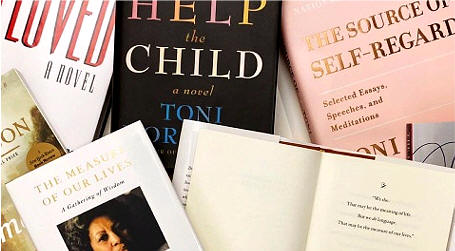
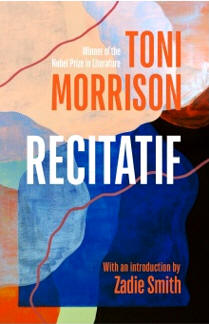
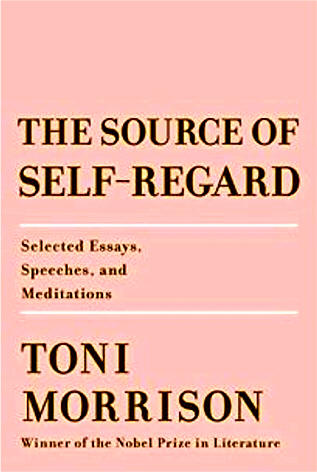
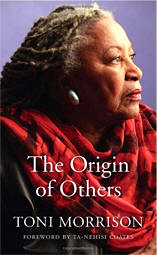 Laye are among the authors
she examines. Readers of Morrison’s fiction will welcome her
discussions of some of her most celebrated books―Beloved, Paradise,
and A Mercy.
Laye are among the authors
she examines. Readers of Morrison’s fiction will welcome her
discussions of some of her most celebrated books―Beloved, Paradise,
and A Mercy.